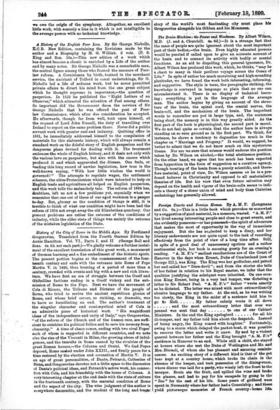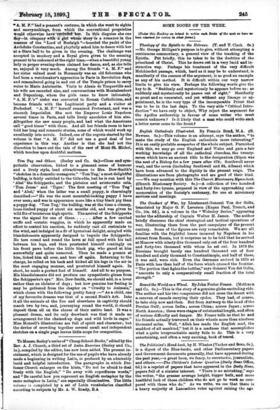Foreign Courts and Foreign Homes. By A. M. F. (Longmans
and Co. 6s.)—This is a little book which provokes us somewhat by a suggestion of good material, in a measure, wasted. "A. M. F." has lived among interesting people and close to great events, and she evidently possesses—or has possessed—the spirit of adventure that makes the most of opportunity in the way of immediate enjoyment. But she has neglected to keep a diary, and her literary endowments are not quite equal to the task of recording effectively from the point of view of a long time after. Still, in spite of a good deal of unnecessary egotism and a rather sentimental style, her book is amusing gossip for an evening's reading. " A. M. F.'s " earliest recollections are of the Court of Hanover in the days when Ernest, Duke of Cumberland (son of George III.), was King. The King was her godfather, and petted her and called her " Dare-devil"; and from the stories she tells of her father in relation to his Royal master, we infer that the qualities justifying the sobriquet were inherited. On one occa- sion King Ernest, being in a very bad temper, was dictating a letter to Sir Robert Peel. " A. M. F.'s" father " wrote exactly as he dictated. The letter was mixed with most extraordinarily abusive language to my father. At the end, as he was writing too slowly, the King in the midst of a sentence told him to
go to Hell My father calmly wrote it all down and the most extraordinary letter that ever was penned was sent that day to one of our Cabinet Ministers. In the end the King apologised for all his
ill-temper, and my father told him about the despatch. Instead of being angry, the King roared with laughter." Fortunately, owing to a storm which delayed the packet-boat, it was possible to recover the letter and write it anew. By and by a violent quarrel between her father and the King brought " A. M. F.'s" residence in Hanover to an end. While still a child, she stayed at houses whore she met the Duke of Wellington and Mr. and Mrs. Disraeli, of whom she has pleasant and amusing reminis- cences. An exciting story of a different kind is that of the pet bear kept at a country house, which broke its chain in the absence of the keeper, and took possession of the dining-room, where dinner was laid for a party, who wisely left the feast to the usurper. Bruin ate the fruit, and spilled the wine and broke the glasses, and had to pay for his escapade by going to the " Zoo" for the rest of his life. Some years of girlhood were spent in Normandy where her father had a Consulship ; and these yield picturesque memories of French country-house life. a A. M. F." had a peasant's costume, in which she went to sights and merrymakings, from which the conventional proprieties would otherwise have–exelndest her. In this disguise she one day—in company with a girl svhose story is a romance in the manner of the " Lord of Burleigh "—boarded the yacht of the Archduke Constantine, and playfully asked him to dance with her at a State ball to be given in the evening. The challenge was accepted in mockery and a Royal glove given to the seeming peasant to be redeemed at the right time,—when a beautiful young lady in proper evening-dress claimed her dance, and, as she tells us, enjoyed it very much. Among the friends " A. M. F." and her sister valued most in Normandy was an old fisherman who had been a watchmaker's apprentice in Paris in Revolution days, and remembered going in and out of the Temple prison to carry water to Marie Antoinette. Visits to Alexis de Tocqueville and his wife are recorded also, and conversations with Montalembert and Dupanloup, whom the girls came to know intimately. " A. M. F.'s" sister was converted to Roman Catholicism, and became friends with the Legitimist party and a visitor at Frohsdorf. " A. M. F." herself remained Protestant, and was a staunch Imperialist. She met the Emperor Louis Napoleon several times in Paris, and tells lively anecdotes of him also. Altogether she saw many people, and had what the Americans call "good times" with them. And all her friends seem to have told her long and romantic stories, some of which would work up excellently into novels. Indeed, one of the regrets started by the volume is that " A. M. F." did not use a good deal of her experience in this way. Another is that she had not the discretion to leave out the tale of the care of Mont St. Michel, which touches upon doubtful matters.







































 Previous page
Previous page